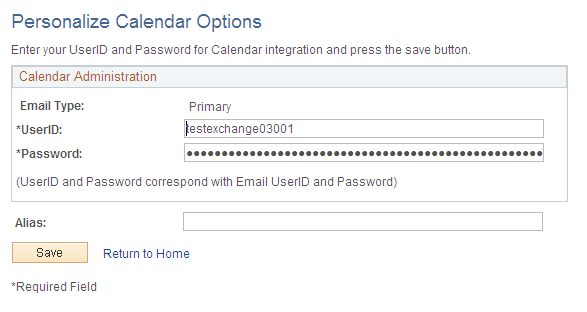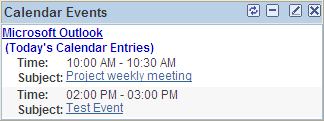Working With the Calendar Events Pagelet
This topic discusses personalizing and using the Calendar Events pagelet.
Use the Personalize Calendar Options page (EO_PE_CAL_PREF) to enter data that allows the Calendar Events pagelet to display your calendar data.
Navigation:
Click the Customize icon on the Calendar Events pagelet.
|
Page Name |
Definition Name |
Usage |
|---|---|---|
|
EO_PE_CAL_PREF |
Enter data that allows the Calendar Events pagelet to display your calendar data. |
Access the Personalize Calendar Options page (click the Customize button on the Calendar Events pagelet).
This example illustrates the fields and controls on the Personalizing Your Calendar Events pagelet. You can find definitions for the fields and controls later on this page.

Field or Control |
Description |
|---|---|
UserID |
Enter the user ID that corresponds to the account type. |
Password |
Enter your password. Note: For Lotus Notes users, use the internet password. This password is stored in the Person document in the Lotus Name and Address Book on the Domino server. |
Mail Box |
Displays if you are using Microsoft Exchange 2003 or 2007. Enter your mailbox name. |
Alias |
This field displays when the Email Type field value is set to Microsoft Outlook. Enter the same alias value that was defined in the active directory setup for the user. This value is used to define the Outlook Web Access/Exchange Server URL. If this field is left blank, then the mailbox name is used to generate the URL. |
Access the Calendar Events Pagelet on the portal homepage.
This example illustrates the fields and controls on the Calendar Events pagelet. You can find definitions for the fields and controls later on this page.

The Calendar Events pagelet displays appointments for the current day.
Field or Control |
Description |
|---|---|
<Server Name> |
Click the link for a server to access the server's URL in a separate browser window. |
Subject |
Click the link for a subject to open that event in a separate browser window. |